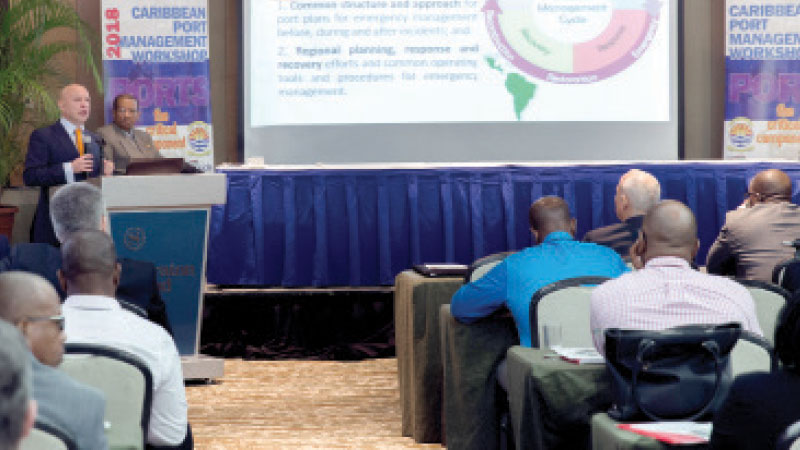By Mike Jarrett
It is vital that the Caribbean consider the many risks that could impact its ports and develop sound plans to combat these risks.
A means of cascading response capabilities from neighbouring countries throughout the Caribbean must be found.
It was in this context that the Secretary of the Organization of American States’ Inter-American Committee on Ports (CIP), Jorge Durán outlined the OAS organization’s regional programme for Capacity Building in Port Logistics for Disaster Risk Management to the inaugural Caribbean Port Management Workshop. The event was held in Panama City on January 22, 23 and 24, 2018.
Mr. Duran told the more than 70 participants from across the region that the programmes main objective was to provide training to port authorities in Small Island Developing States (SIDS) in the Caribbean and to prepare and administer humanitarian assistance, equipment and supplies before, during and after disasters and complex emergencies.
Manmade and natural hazards pose a high risk to the operation of ports all around the Americas, Mr. Duran said. However, in Caribbean SIDS, national economies depend heavily on trade, ample justification for the programme. Ports in the Caribbean SIDS are critical to the management of international humanitarian assistance in cases of disasters, he emphasised.
Components
The CIP Secretary outlined five components of the Capacity Building in Port Logistics for Disaster Risk Management programme:
1. Assessment (risk and capabilities): A comprehensive review of both the manmade and natural hazards that have the potential to threaten or disrupt Caribbean.
2. Emergency Response Plan Prototype: Development of a prototype Emergency Response Plan for a Caribbean Port to address the risks posed by natural and manmade hazards to ports.
3. Training: Training represents the bulk of the project. It will include workshops and seminars, delivered in cooperation with Strategic Partners
4. Regional simulations and drills: Design, facilitation and evaluation of emergency response drills, exercises and simulations with the participation of ports authorities.
5. Model legislation, regulation and procedures: Look into international agreements and instruments to complete their own emergency response plan based on the prototype provided in component 2.
The programme is regional in scope and is predicated on region-wide Inter-Agency Coordination including the Port Management Association of the Caribbean.
And, anticipated outcomes include: (a) a common structure and approach for port plans for emergency management before, during and after incidents; and; (b) the launch of regional planning, response and recovery efforts as well as establishment of common operating tools and procedures for emergency management.
Deliverables
Mr. Duran identified six deliverables of the programme:
1. Risk assessment developed;
2. Training and capacity building delivered on:
(i) Disaster /emergency readiness –disaster preparedness, including national/port emergency response plan identifying inter-agency coordination needs;
(ii) Humanitarian supply and equipment management –including classification, labeling, storage and distribution;
(iii) Humanitarian supply disposal post-disaster –including expired medicines, food and food containers; and,
(iv) Model legislation and procedures;
3. Emergency response drills, exercises and simulations designed and delivered;
4. Model or prototype developed for: emergency response plan; custom laws; and, regulations with disaster risk management considerations;
5. Training and capacity building delivered in the implementation of international conventions, instruments and agreements, soft and hard law related to emergency management and readiness, customs and immigration; and,
6. A Directory of experts with expertise profile (integrated into the Inter-American Network for Disaster Mitigation (INDM)).
Communication system
The CIP executive said that, as a first step to establishing a communication system, funding would be sought to establish a restricted site, where members of the Framework can exchange information in a secure manner.
He said that, in collaboration with HudsonAnalytix, a project proposal for the establishment of a reliable and secure direct communication system has been developed, offering a range of internationally recognized training programmes.
See OAS-CIP document: Planned Initiatives in the Caribbean for 2017-2018.

